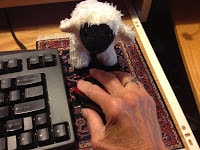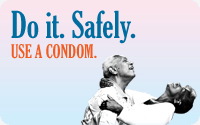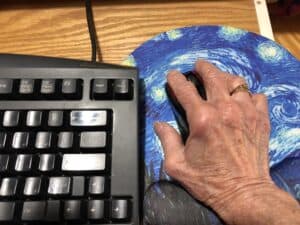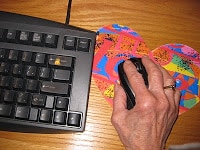Posts Tagged ‘dating at our age’
Saying “No” with Class: Rejections I’ve Liked
1/16/2023 update: One of my ongoing tasks is culling my 17+ years (!) of blog posts. Working backwards from 2005, I’m working on deleting those that are outdated, no longer interesting or useful, reviews of sex toys that no longer exist or from companies I no longer endorse, and so on.
Occasionally, though, I hit upon a topic that is as relevant now as when I wrote it, such as this one from 2011. If you’ve been rejected by a date or potential date — or done the rejecting — in a way that’s kind and respectful, please share in the comments.
Originally published January 2011:
My dabbling in online dating continues to be interesting, often funny, sometimes frustrating when the dating sites seem to ignore my criteria when announcing with great fanfare that they’ve found a match for me.
I’m going into this to expand my social life and meet good men who might become friends, or provide an hour of interesting conversation, or stimulate me to pursue a deeper relationship — or just remind me why I enjoy my single life. I’m not earnestly seeking a soul mate or looking to get married. This gives me the advantage of being able to take this whole process lightly, and my day is not ruined by a rejection or by the paucity of applause-inducing matches.
Sometimes I read a profile that leaves me saying, “Wow! I’d like to know this person!” and I send an e-note expressing why his profile interested me. Occasionally my interest is returned, but that’s rare (I’m not sure why). Usually I’m ignored. I really like it, though, when the recipient of my interest sends me a polite “No, thank you.”
To encourage you to do this, here are some of the nice ways I’ve been turned down:
- Thanks for the note and kind comments. My age range is general, like any sensible man would say, but it can be a factor. Equally, if not more, important, is the geographic range. While I know that your city is not on the other side of the moon [comment from Joan: we live about 40 mi. apart], it is too far for me at this point of this odd online dating process. I have tried the long distance relationship a few times, and each time, it proved too much the struggle. So, thanks for reaching out, and I wish you the best.
-
I am so honored that you would send me an email. You look and sound like a delightful woman, and I enjoyed reading your profile. However, as flattered as I am by your contact, it’s my strong hunch that we’re really not a match. So, let me send you my best wishes for meeting your match.
- Actually, I am looking for a soul-mate. Dating and friendship is fine, but I would like to “go all the way” as it were. About four years ago, I dated a woman who had lost her husband and I thought we were a pretty good fit, but she loved her husband very much and had no room for me. You seem like a smart and interesting person, and I could be making a mistake, but somehow I feel that we aren’t a good fit either. You may be right in looking for a widower. Thanks for writing me.
- Thank you for the contact and the nice words. I am in a process of transition, learning to listen to myself and find out what I am looking for at this juncture in my life. You seem like a beautiful and interesting person. However at this point I don’t feel that we would be a good match for dating. I send my heartfelt wishes to you to find the person and love that you seek and deserve.
Readers: Have you received “no, thank you” notes that made you smile instead of cringe? Have you sent any you’d like to share? Please comment.
“Friends with benefits” — do we need a new term?
 Question to readers: I know that many people in our age group have “friends with benefits” (FWB), or would like to. Do we need a new term for it?
Question to readers: I know that many people in our age group have “friends with benefits” (FWB), or would like to. Do we need a new term for it?
I’m talking about a relationship that is sexual but also a solid friendship — we like each other in and out of bed — yet it’s not a committed relationship and will not become one.
We’re not partners and we’re not dating exactly — we just get together when we both want to, and sex is usually part of the package. We stay in touch in between times together. We’re both free to pursue and explore other relationships. We don’t have goals of our FWB becoming more (or different) than the way we’re enjoying each other right now. It is what it is, and we like that.
It’s not the same as a “hookup” or “bootie call” because we share an emotional closeness — yet without any expectations or restrictions about what we do when we’re not together.
What do you think? Is “friends with benefits” a good enough term? Or does that sound too casual or non-caring? One person suggested “limited relationship” as opposed to “committed” or “primary” relationship, but that seems to emphasize what it isn’t rather than what it is. I suggested “lover-friends.” I hope you’ll add your point of view.
I hope you’ll post a comment using a first name of your choice (choose something other than “anonymous”), plus your age, please, so we can see how our generation thinks.
Feel free to add your FWB experience after age 50, if you care to share. I think this kind of relationship is far more common than we know!

Thank you in advance for commenting!
Daring to Date Again by Ann Anderson Evans
3/11/15 update: This Sunday, March 15, I’ll have the pleasure of being on a panel with Ann Anderson Evans called “Never Too Late to Date” at the Tucson Festival of Books. I’m moving this post, originally published 11/13/14, to the top so that you all know about Ann’s book and our discussion of safer sex:
When a sixty-year-old, twice-divorced woman starts to date again, she’s not pinning her hopes on an invitation to the prom. She is financially stable and professionally creditialed. She is a matriarch, a pillar of her church, a member of a choir. She has children and neighbors who might disapprove. She has a lot at stake.
So begins Daring to Date Again, a lusty memoir by Ann Anderson Evans about looking for romp-in-the-hay partners after 12 years of celibacy.
Evans is smart, sassy, articulate, and a darned good writer, pulling you right into her adventures. You’ll laugh, empathize, and sometimes worry as she jumps into bed with her Mr. Right-for-the-Moment parade. She wears her heart on her sleeve—or she wears nothing at all—and we share her adventures, her thoughts, her desires, and her evolution from repressed and unhappy to evolved, sexy, and joyful.
Evans finds many men who are interested in having no-strings sex with her, but towards the end of the book, she wonders whether true love even exists — and if so, where is it hiding? I’m not ruining the book by telling you that she meets Terry — a fellow professor and a bachelor at 63. They fall in love and marry. But that’s not until the last chapter!
I enjoyed this well-written book, and I recommend it to you, whether you’re exploring sexual possibilities yourself or you just want to share her escapades vicariously.
However! As a safer-sex advocate, I was concerned because there was no mention of safer sex or any discussions of condom use with the men Evans bedded. I questioned her — no, they never used protection. Then I challenged her to explain her decision(s). She wrote this to me:
Joan chided me for not mentioning safe sex in Daring to Date Again. Logic suggests that simply interrogating a man regarding his sexual health is not sufficient protection, but that is what I relied upon. Why was I more concerned about cleaning the chopping block after cutting up chicken than about having unprotected sex? Why would I maintain the prophylactic habits of regular dental visits and colonoscopies, and yet have unprotected sex? Good question, Joan.
Indulgence was part of it. Pregnancy had been such a persistent worry when I was a young woman that having sex spontaneously was a joy. It was like winning the lottery.
Growing up in the 50s and 60s, I was taught either nothing or nonsense about sex. The bogus teachings were embedded in religion. “Chastity is the cement of civilization,” I read in the Christian Science scriptural companion, the Science & Health, when I was a student in a Christian Science college. I closed that book and have never reopened it.
The nonsense of the times I grew up in was also embedded in school. My only sex education was a couple of gender-divided classes in 7th grade that explained menstruation twinned with the unforgettable fact that when we brushed our teeth we should also be careful to brush our tongues. I was stunned when I got pregnant at 18. I thought I had to want to become pregnant in order to be so.
Between the church and school, I felt manipulated, demeaned, and endangered. Many of those who matured in the 60s rose up in mighty defiance of the bullying traditions of ignorance. In answering Joan’s challenge, I am surprised at my resurgence of anger when I think back.
Perhaps unconsciously, I placed barrier protection during sex in the basket which also included the bogus virtues of chastity, heterosexuality, sitting primly with your legs crossed, wearing a girdle, avoiding nudity, and virginity upon marriage. These virtues are so often ignored that they can only be seen as vacuous wishes. My failure to protect myself was a visceral, instinctive, and senseless act of defiance.
I take responsibility for my own actions, but it would have been helpful if the doctors (including gynecologists) had asked me if I was sexually active during that time. One general practitioner did ask me, and when I told him I had had sex with four men within the last two years he sidestepped the issue, saying, “I think you should talk to your gynecologist about that.”
I sympathize with the doctors. Discussions of sex with patients are probably minefields of religion, politics, family tradition, and personal history. But the medical profession has obviously given up the fight. How often do you see an ad for condoms displayed in your doctor’s office alongside the latest drug for depression or high blood pressure?
I felt embattled during my three years of promiscuity. Not one of the men I was involved with ever mentioned using a condom. If any of them had one in their pocket, they didn’t mention it. Joan might be better equipped to say whether men are just as likely as women to insist on condom use. In my experience, this has not been the case.
The problem of unprotected sex is far more pervasive than that of a single American raised before the Enlightenment. Our failure to identify and rectify the sociological, psychological, historical, and political reasons why people do not use condoms or other barriers has guaranteed that AIDS and other STDs continue worldwide. Saying the answer is education is simplistic. Why we don’t use them is baffling. The reason begins in the outside world of church, school, family, and government policy and all of these play themselves out in the bedroom.
Thank you, Ann, for your eloquent explanation. I can’t help hoisting my 4’10” self up onto my soapbox again to remind my readers: Have all the fun you want, but please have it safely!
 Listen to Evans read an excerpt from Daring to Date Again here.
Listen to Evans read an excerpt from Daring to Date Again here.Dating After 50, 60, 75 — Making Our Own Rules
 “Online Dating Over 50: The Rules of The Game” on Huffington Post began,
“Online Dating Over 50: The Rules of The Game” on Huffington Post began,
Monica Porter, who dated “dangerously” for a year, shares nine top tips to help protect yourself, including: don’t believe anything, be careful who you get into bed with and split the check. If you’re looking for romance through online dating, make skepticism your starting point, says Monica.
Sure, “be careful whom you get in bed with” and “split the check” are reasonable, whatever your age and whether you’re dating online or some other way. But the negative attitude overall made me cringe For example,
Rule #1 of dating over 50: Don’t believe anyone. Emotionally, you need to construct a wall around yourself which nobody can penetrate until you believe it to be safe. People will plunder your emotions without compunction if you let them. It is up to you keep them locked up, like jewels.
Really? I’ve been online dating for a while now, and though I have my own frustrations with it (see my advice to men here), fearing that my precious emotions will be plundered if I don’t lock them up is not one of them.
Personally, I think that most people of our age who are using online dating sites are looking for love/ lust/ sex/ adventure/ friendship/ companionship, or some combination of these; feel as vulnerable as we do; and have good intentions. Am I naive?
Isn’t the point of a first date to know each other enough to decide whether we want a second date? Isn’t part of that being ourselves, talking openly, and, yes, risking a little? I’ve met people who have their emotions locked up, and I have no interest in dating them.
I invited the fans of my Naked at Our Age Facebook page to weigh in. Boy howdy, were you willing! Here are some of your points:
Janet, 55: I agree, it is very negative. If you go into online dating with fear and negativity, that is what you will attract. I suggest: Know yourself, be clear about what you expect from the site, be clear on the qualities of a date you are seeking, be ruthlessly honest because you have nothing to lose — you don’t want to waste time in a charade. This is the time of life to be real. Be you, be positive, have fun and you will attract what you put out.
Dana, 62: I tried online dating and it seemed like every man I met had a laundry list, and I was too short, not brunette, too chunky, not enough like their ex wife, too much like their ex wife, too independent, not independent enough, too sexual, too frigid, and on and on. They had this woman pictured in their mind and were looking for her and her alone. My strongest recommendation would be not to make snap judgments at the first meeting. Be willing to let things unfold, be curious. Resist the temptation to judge a book by its cover. Just relax and don’t be on the hunt for your “soul mate” (whatever the heck that is). Find a true friend, a joyful companion, a kind soul and be nice. Let life, God, the universe, fate (whatever you want to call it) choose for you.
Jim, 58: As negative as it may be, is the article accurate? I say, for the most part, yes. Photos are old, many of them are of flowers, their dog, whatever. Would it be nice for a woman to offer to help pay for a nice dinner? Never happens. Not that I would accept it either, but the offer would be nice. I think we all have preconceived notions of what we want, but I agree that you need to let things flow. I find that many women aren’t ready to date, let alone have a new relationship. After 3-4 dates, it’s “I just don’t think I’m ready,” or “my ex BF is really trying to be a better man so I’m going to go back and give it another try,” or “I thought I was ready but now I’m not sure.”
Ruth, 67: I think the Huff Post article is valid to some extent — don’t believe anybody! It doesn’t mention that you can ask for a reference after you’ve met someone for the first time and before you hop into bed with them. You can find out about the person’s honesty and relationship history from someone else’s point of view. I don’t agree with the statement, “If you meet someone you fancy, by all means enjoy good, fun sex. But – hard-nosed as it sounds, and I can’t pretend it’s always easy – take the emotion out of it or you will be hurt over and over again.” I can’t take the emotion out of sex and I’m not sure many people can.
Paula Ellen, 53: I find the photo with the article pretty offensive. Why isn’t there a photo of a 60-year-old, gray-haired woman with a thirty-something male? Jesus.
Brian, 64 :
I’m a verbal guy, I’m not interested in profiles without a lot of writing either in the profile essays, or in the explanations of the questions on OKCupid. That’s where I gauge such things as sense of humor, care for others, and intellectual curiosity. I wonder what women are thinking when they post a profile picture showing them scowling or otherwise looking unhappy. My correspondents tell me that they get tons of messages from men on the model of “Hi beautiful, what’s up?” (That sort is the more tasteful) I can’t give advice on how to handle this, except to put clearly in your profile something that you ask for a comment on, if only to see if someone actually read it. I sent a woman one of my usual cheerleading notes, telling her how much I loved her profile and wishing her good luck. Six months later, we’ve got a very fine romance going, despite the long distance. As it happened, one of my lovers had just said goodbye for reasons best known to her, and I had some time/energy to spare.
So, be careful what you don’t ask for. You may get it.
Ashton, 62: I agree that that article is way too negative. I’m a fan of OK Cupid and I think you need to go into it open-minded rather than paranoid. My #1 rule of online dating is to meet sooner rather than later.
Cyril, 65: While I agree that the wording is negative and excessively emphasizes the need for caution, we should not be gullible or leave ourselves open to exploitation, whether by a date or a rogue trader. Simply put, make sure they have earned your trust before you open up.
Chuck: I’m 74 and my honey is 78. We met on JDate two years ago. The obvious catalyst is honesty–and candor. We got the heavy lifting done on our first date (my alcoholism and depression, her husband’s dementia) and moved on from there. Respecting one another’s history and allowing space for individualism, these have worked so well for us.


